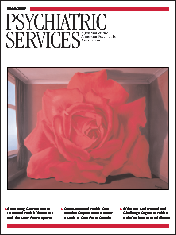Religiosity, Psychosocial Adjustment, and Subjective Burden of Persons Who Care for Those With Mental Illness
Abstract
OBJECTIVE: The purpose of this study was to characterize the nature of religious and spiritual support received by family caregivers of persons with serious mental illness and to test hypotheses that religiosity would be associated with caregiver adjustment. METHODS: Eighty-three caregivers who participated in a study of the Family to Family Education Program of the National Alliance on Mental Illness were assessed at baseline in terms of their religiosity and receipt of spiritual support in coping. They also completed measures of depression, self-esteem, mastery, self-care, and subjective burden. Hierarchical regression was used to test hypotheses that religiosity would be associated with better adjustment, with confounding variables controlled for. RESULTS: Thirty-seven percent of participants reported that they had received spiritual support in coping with their relative's illness in the previous three months. When age, race, education, and gender were controlled for, religiosity was associated with less depression and better self-esteem and self-care. Personal religiosity was a stronger predictor of adjustment than religious service attendance. CONCLUSIONS: Family caregivers of persons with serious mental illness often turn to spirituality for support, and religiosity may be an important contributor to caregiver adjustment. Collaborative partnerships between mental health professionals and religious and spiritual communities represent a powerful and culturally sensitive resource for meeting the support needs of family members of persons with serious mental illness.



